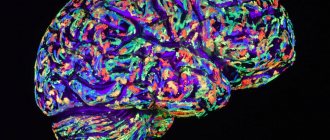Personality development concepts are specific ways of understanding and explaining human personality development. Today, there are various alternative concepts of development that describe the individual's personality as a unifying whole and explain the differences between subjects.
The concept of personal development is much broader than the simple development of capabilities and abilities. Knowledge of the psychology of personality development allows us to understand the very essence of human nature and his individuality. However, modern science currently cannot offer a unified concept for the development of an individual’s personality. The forces that promote and push development are the internal contradictions inherent in the development process. Contradictions consist of opposite conflicting principles.
Psychology of personal growth through motivation
“Psychology of personal growth” and “psychology of personality development” are similar concepts, but they are not much different. Many experts have repeatedly started discussions on the topic of the relationship between these branches of psychology, and only now their similarity has been proven. The fact is that the psychology of personality development itself goes shoulder to shoulder with the psychology of personal growth; they are completely interconnected and cannot exist without each other. It is about them that we will tell our readers today.
Personality is a high concept, meaning a fully formed and socialized person in the modern world, and possessing the psychological characteristics necessary for life in society.
Let's start with the fact that “ personal growth ” is a concept that came to us from the branches of the science of psychology. If we break down the term “psychology” itself, we will see that it consists of two ancient Greek words: “teaching” and “soul,” thereby showing us that the study of the human soul is worthy of a separate niche in the scientific world.
If we return to the psychology of personal growth, then it already studies in more depth the concepts of the laws of personality development and the very vision of the original human nature in a positive way. This section of psychology helps to develop a person’s inner potential and give him an impetus on the path of self-development.
The path in personality development psychology
Human nature and the path to personal self-education
Human nature has its own classification in psychology:
- Definitely positive;
- Conditionally positive;
- Neutral;
- Damaged.
Already based on the identified human nature, it is possible to build a path to personal growth.
For example, in the “unconditionally positive” nature of a person, the meaning of education will be the help of a psychologist in actualizing him. With a “conditionally positive” human nature, the meaning of education will change to the existential approach of a psychologist in helping with choice.
If we take neutral human nature, then the meaning of education will be the formation and correction of personality by a psychologist. As for the last variation of human nature - damaged, here a more difficult task will fall on the shoulders of the psychologist - correction and compensation.
The origins of the psychology of personal growth
If we return to the origins of the theory of the psychology of personal growth, then we should thank its “fathers”, American psychologists Carl Ransom Rogers and Abraham Harold Maslow. It was they who once created their own humanistic concept, within the framework of which the psychology of personal growth was formed.
Psychology of personal growth in the modern world
Years of practice and work of many talented psychologists have “polished” the psychology of personal growth in their own way, transforming it into a convenient tool for conducting motivational training on human self-development.
In modern practice, such training is especially popular among psychologists and their students. But it is worth noting that the original theory of the psychology of personal growth acquired its own new features over time.
For example, our contemporary, business coach Grigory Spizhevoy, authored a new book on the topic of personal growth. His theory includes such concepts as “inner harmony”, “relationship with oneself”, “I+I relationship”, “I+other relationship”, “relationship with the outside world” and, of course, “self-development”. According to Spizheva, all these concepts constitute the entire psychology of personal growth.
Changing and adjusting personal development plans
The consciousness formed by the human personality itself is different from the one that is present in it from birth. The psychology of self-knowledge includes accumulated experience, as a result of which life, activities and assigned tasks are rethought. Normal self-development leads to the ability to successfully cope with tasks. It is important to develop a positive self-esteem by generalizing practical knowledge and experience relative to others. Any change in social status affects a person’s opinion of himself and the culprit of these changes.
Personal development in psychology
Personal development is a branch of psychology that deals with personal growth and self-development. This section of the psychology of personal development includes all changes in the psychological attitudes and processes of a person as an individual, under external and internal influences on him.
Personal development can be formed in a person not only with the help of his independent work, but also under the influence of any other external factors. The development of a person’s personality is a rather long process that accompanies him throughout his entire life journey. This can also affect personal development in human psychology, thanks to his continuous interaction with the outside world and other people.
To some extent, the human psyche is like a sponge. She absorbs everything that happens around her, which is reflected in a person’s personal self-development and development. That is why, in some cases, even an already formed personality needs correction by a professional psychoanalyst. Photo 4 – the result of personal development in psychology – complete harmony with oneself.
Personality PsychologyGroup of authors, 2021
1.3. Temperament
Temperament is a set of individual characteristics that characterize the dynamic and emotional aspects of human behavior, his activities and communication. Only conditionally can temperament be classified as a personality component, since its characteristics, as a rule, are determined biologically and are innate. Temperament is closely related to character, and in an adult it is difficult to separate them.
Temperament can be divided into four most general types: choleric, sanguine, phlegmatic, melancholic. This division has a long history (Hippocrates, Galen, Kant, Pavlov, etc.), although there are other classifications of temperament types (Kretschmer, Sheldon, Seago, etc.).
1. Choleric is a strong type of temperament, manifested in general mobility and the ability to devote oneself to a task with exceptional passion, in violent emotions, sudden changes in mood, and imbalance.
2. Sanguine is a strong type of temperament, characterized by mobility, high mental activity, variety of facial expressions, responsiveness and sociability, and balance.
3. Phlegmatic - a strong type of temperament associated with slowness, inertia, stability in aspirations and mood, weak external expression of emotions, and a low level of mental activity.
4. Melancholic is a weak type of temperament, which is characterized by slowness of movements, restraint of motor skills and speech, low level of mental activity, slight vulnerability, a tendency to deeply experience even minor events, a predominance of negative emotions, and sensitivity.
There are no good or bad temperaments. Each of them has its own advantages and disadvantages. The advantage of a choleric person is the ability to concentrate significant efforts in a short period of time, but the disadvantage is that during long-term work he does not always have enough endurance. A sanguine person, having a quick reaction and increased work capacity in the initial period of work, by the end of work reduces his work capacity not only due to rapid fatigue, but also due to a loss of interest. The advantage of a phlegmatic person is the ability to work long and hard, but he is not able to quickly get together and concentrate his efforts. A melancholic person is distinguished by great endurance, but slow entry into work; his performance is higher in the middle or at the end of work, and not at its beginning.
The type of temperament must be taken into account in specialties where work places special demands on the dynamic and emotional qualities of a person.
Properties of temperament
. Temperament and personality. Most researchers of temperament identify the following properties that are closely related to each other and to qualities of character: sensitivity - a human characteristic that manifests itself in the occurrence of sensitivity (mental reaction) to an external stimulus of the least strength; reactivity is a human characteristic associated with the strength of the emotional reaction to external and internal stimuli; activity - a person’s ability, which consists in overcoming external and internal restrictions in production, in socially significant transformations, in appropriating wealth, and assimilating spiritual culture; the pace of reactions is a feature of a person, which consists in the speed of mental processes, and to a certain extent, mental states; plasticity - rigidity - the characteristics of a person to adapt flexibly and easily to new conditions, or to behave skeletally, inertly, insensitively in changed conditions; extroversion-introversion - human characteristics, expressed in the predominant direction of personality activity either outward (to the world of external objects: surrounding people, events, objects) or inward (to the phenomena of one’s own subjective world, one’s experiences and thoughts).
Temperament
, being innate, is the basis of most personality traits. But it only determines the dynamics of their manifestation (sensibility, emotionality, impulsiveness, anxiety).
Impressionability
- a human property that characterizes the degree of influence of various stimuli, the time they are stored in memory and the strength of the response to this influence.
Emotionality
- a property expressed in speed, content, quality, depth, dynamics of emotional processes and states.
Impulsiveness
- a property consisting in a person’s tendency to act on the first impulse, spontaneously under the influence of external influences or suddenly surging emotions.
Anxiety
- an increased tendency of a person to experience anxiety in any situation in life, including those not conducive to it. The concept of anxiety is close to the concept of neuroticism (G.I. Eysenck).
These features of temperament influence characterological traits, the development and manifestation of a person’s abilities.
Practical tasks
1. How can we define temperament?
2. What are temperament types?
3. How do temperament, activity and communication interact?
4. What personality traits should be classified as temperament properties?
5. What is the relationship between temperament and personality?
6. What type of temperament - choleric, sanguine, phlegmatic or melancholic - do the following characteristics correspond to:
a) Somewhat slow reactions, stable mood, outwardly little expressed emotional sphere. Remains quite self-possessed and calm, does not allow impulsive movements in difficult life situations. Shows great persistence in completing a task, correctly calculating his strength. Stereotypes of mating, behavior is often not flexible enough, switching of attention, activity and communication is slowed down to a certain extent. He achieves the greatest success in professions that require perseverance, uniform effort, stability of attention and great patience.
b) Increased emotional reactivity, sharp pace and speed in movements, greater energy and straightforwardness in relationships. Under unfavorable conditions, increased excitability can lead to short temper and, in some cases, aggressiveness. Sudden change of mood. Able to overcome significant difficulties, devote himself to work with great passion with correspondingly high motivation. Achieves the greatest results in professions that require increased reactivity and significant simultaneous effort.
c) Increased vulnerability, a tendency to experience deep emotions even for minor reasons. Feelings arise easily, are poorly contained, and are clearly expressed outwardly. Strong external influences make it difficult for him to function and communicate. Closed, avoids new surroundings. Under unfavorable living conditions, shyness, timidity, indecision, as well as cowardice quickly arise. But in a favorable, stable environment, he can achieve significant success in professions that require increased sensitivity (sensitivity) and reactivity;
d) Easy adaptability to changing living conditions, increased contact with other people, easy emergence and rapid change of feelings, stereotypes are quite flexible, relaxed in a new environment, capable of quickly switching attention, activity and communication. The most successful types of profession require quick reactions and increased sociability.
TEST
Identify yourself using a personality questionnaire
Eysenck (EPI). A simplified male version is given (women make appropriate adjustments to the questions). Answer “yes” or “no” to the following questions (work quickly, without spending a lot of time thinking, your first reaction is important, and not the result of long thoughts, you need to answer every question without missing a single one).
1. Do you often feel a craving for new experiences, to shake yourself up, to experience excitement?
2. Do you often need friends who understand you and can encourage and console you?
3. Are you a carefree person?
4. Do you find it difficult to answer “no”?
5. Do you think before you do anything?
6. If you promised to do something, do you always keep your promise?
7. Do you often have ups and downs in your mood?
8. Do you usually act and speak quickly, without thinking?
9. Do you often feel like an unhappy person without sufficient reasons?
10. Would you do anything for a dare?
11. Do you feel shy or embarrassed when you want to start a conversation with an attractive stranger?
12. Do you sometimes lose your temper and get angry?
13. Do you often act under the influence of a momentary mood?
14. Do you often worry because you have done or said something that you should not have done or said?
Mechanisms of personality development in psychology
The mechanisms of personality development in psychology are appropriation, isolation and identification of the individual.
If we look more deeply, then appropriation is the creation and formation of personality through a person’s communication with the outside world, in the literal sense of the word - the imposition of world principles and orders on him. Separation acts as a defense of its original natural essence. And identification is the reverse process - a correlation, and sometimes even a person’s copying of those around him or his idols.
Assignment
Thus, such a mechanism of personality development in psychology as “appropriation” is inherently the most widespread. In itself, it implies the independent formation and development of personality when a person comes into contact with the environment. That is, any of his personal and social activities contributes to the formation and “appropriation” of personal qualities and their subsequent development.
Separation
Such a mechanism of personality development in psychology as “isolation” carries much more freedom than “appropriation”. In this case, the individual is not ready to accept social principles and strive to distinguish himself from the rest. In this case, the process of individualization is launched, which forms the individual personal qualities of a person, separating him from other representatives of society.
Moreover, this mechanism of personality development in psychology has two directions at once: internal (psychological) and external (material-physical). Internal formation includes individual psychological characteristics (level of intelligence, type of temperament, character traits, and so on), and external formation includes physical changes (nationality, gender identity, and so on).
Identification
The last mechanism of personality development in psychology – “identification” – is the most complex. In this case, the individual tries to imitate the object in which he shows sympathy or interest. That is, this is the process of copying another personality on emotional and other levels. It is not without reason that they say that children from an early age imitate their parents in everything; this is precisely where this mechanism of personality development in psychology comes into play.
The concept of spiritual and moral development of personality
The main thing in the formation of the semantic characteristics of human life is its relationship to other subjects or society as a whole. It is attitude that constitutes the essence of human life. The entire life of subjects depends on relationships with other people, on the individual’s aspirations for relationships, and what specific relationships the individual is able to establish.
Upbringing is an integral part of education and the concept of spiritual and moral development of the individual. It is thanks to family upbringing and school education that the process of familiarization with the cultural and moral values of society occurs. It is necessary to instill in children the ability to live in a cultural social space. Such a space should meet the interests and needs of students, thereby pushing them to create and implement accepted moral values.
In current conditions, the emphasis in the concept of spiritual and moral education is on the purposefulness of the educational process, as well as on universal ethics, which means that it is necessary to prevent education from being reduced to narrowly national, corporate, group and other interests. It is necessary to educate a developed personality in all areas of culture, religion, touching absolutely all social classes and groups, ethnic groups.
What is important is the combination in the educational process of being focused on the universal values of people and relying on the traditional, national spiritual values of society. This combination should form the basis of the life of the current society, as well as the basis of optimal dialogue between different communities and groups.
A shift in orientation occurs from external restrictions of morality to internal moral attitudes and the subject’s orientation towards the increasing role of moral attitudes as an internal self-regulation of the individual, and not towards morality, which is more of an external regulator of behavior.
The problem of the individual’s ability to self-determinate and focus on the semantic and value components of the educational process is important. It should be that the student himself is able to develop value meanings through the acquisition of moral knowledge, feel them emotionally, test them through personal experience of building relationships with other individuals and the environment, and take an active position in this process. It is the assimilation, gradual development, acquisition of experience and knowledge of behavioral relationships that should form the basis of spiritual and moral development.
The goal of spiritual and moral development is the education and development of literate, highly moral, cultural individuals who have universal and national values of individuals whose activities are aimed at creation.
Universal values include values accepted by all people in the conditions of absolutely any social and historical changes in the development of civilization. These include: equality, goodness, beauty, life, cooperation and others. And national values are determined by universal values, perceived by subjective consciousness through national culture and national self-awareness.
Laws of personality development
The psychology of personal growth is a rather complex process, and carries its own patterns and laws of personality development. Without them, it would be difficult to create educational programs for children and adolescents whose personalities are just forming. Also, the laws of personality development help qualified psychoanalysts better understand their patients and more effectively help them in the process of their formation and self-development.
The laws of personality development include:
- The presence of psychological changes in an individual.
- The relationship between different areas of development and their directions.
- The emergence of specific developmental features.
- Differences in development according to time frame and other criteria (different development between peers).
- Formation of clear views and personal beliefs.
- Development of certain psychological characteristics (sensitivity).
- Processing and learning/awareness of different areas of life.
- Plasticity of personality development (compensation for the development of one personality component by another).
- Contradiction between the individual and the world around him.
- Constant progress in personal development.
The concept of personality and the conditions of its psychological development
Remark 1
There are a great many definitions of the concept of personality; if we put them together, we can imagine personality as a person taken in a system of socially conditioned psychological characteristics that manifest themselves in social relations, are stable and determine the nature of the individual’s moral actions, significant both for himself and for his immediate environment.
Child development is a process that occurs in certain conditions, surrounded by the cultural and material heritage of mankind, in the system of established relations between members of a particular society. Thus, we can confidently say that the development of a child’s personality depends entirely on the social situation.
It is she who predetermines all the changes that will occur to the individual during the period of growing up. Thanks to the social situation, it is possible to determine the paths and forms of development, types of activities, new mental qualities and properties acquired by the child.
Too lazy to read?
Ask a question to the experts and get an answer within 15 minutes!
Ask a Question
This is precisely what constitutes the conditions for the mental development of the child’s personality, and in this regard, maximum attention should be paid to the social conditions that surround the child.
Psychology of personality development and health
The psychological state and stability of a person’s purity of mind are important indicators of his health. That is why the psychology of personal growth or personality development is so important when creating a full-fledged healthy person.
If we return to the types of human nature, we can draw the corresponding conclusion that if he has a positive nature, he is completely psychologically healthy. If human nature is damaged, then its restoration to a positive level will be considered a complete psychological recovery of the individual. That is, in this case, it is unlikely that even the most experienced coach in personal growth training will be able to carry out such manipulations. Here you will need professional long-term work with a psychologist, and only a specialist in this profile can help in this case.
IMPORTANT! The human psyche is a delicate and sensitive instrument, do not self-medicate; if you encounter any problems or serious experiences that affect your emotional and mental state, immediately contact a specialist.
Stay healthy and don’t be afraid to reach new personal heights of self-development!
Stages of self-development and self-improvement
You can develop yourself by focusing on personal growth techniques. This is not a method that helps you achieve everything you want without effort. Those who embark on this path must prepare for hard work. The psychology of personal growth is working on shortcomings and improving one’s characteristics. Overcoming fears and expanding boundaries is a labor-intensive process and a serious test. Personal development in this technology should contribute to achieving success in all endeavors.
When starting education and self-education training, like any other, you should follow the principle of gradualness in order to prevent overload. A lot of stress can be harmful to the body. When starting training, you also need to get acquainted with the general plan, as well as create your own.
Awareness of the need for change
Having taken this direction in moving along the path of self-improvement, you need to realize what the benefits of the process are. Doesn't this complicate life in general? At the first stage, you should think about whether it is possible to carry out self-development without stopping, constantly maintaining the level. You will need to constantly acquire skills, set goals and realize dreams. If there is no understanding of the need for personal development in the life process, trainings, exercises and books will not help.
Identifying your shortcomings and areas for development
The initial stages of personality development include the following activities.
- You need to form a front of necessary actions to work on yourself. That is: reconsider your strengths and identify everything that needs improvement. The development of attention in the process also requires it in relation to its attractiveness.
- Make a plan to overcome the shortcomings.
Forming an image of the desired future and setting goals
The stages of personality development require motivation when taking the first steps. Without the desire to improve yourself, attempts will be doomed to failure. These are the following motives.
- Self-affirmation, the intention to look better in the eyes of those close to you. It is necessary to increase status and self-esteem.
- The psychology of personality development involves the desire to be like someone successful and imitation of him.
- Improving skills in managing others is a power motive that is also necessary.
- The desire to engage in an activity includes obtaining satisfaction from it. Carrying out responsibilities can be fun.
- Stages of personal development in terms of overcoming them can bring a feeling of joy as a consequence of success. It motivates for further advancement: setting and achieving goals.
- The psychology of self-knowledge is also the desire to achieve heights in one’s fields of activity, the desire to achieve perfection.
- The person feels the need to be part of a community engaged in a similar process.
These types of motivation require the formation and development of personality.
Choosing ways to achieve results
The next level in the theory of development and personal growth can be realized in several ways. The basis of various approaches is both your own perseverance and methods using the help of specialists. The psychology of self-development consists of the following generally accepted methods of personal growth.
- Acquaintance with literature, study of relevant books. The disadvantage is that the speed of progress is slow; you need to understand all aspects yourself. And also look for the right steps in the flow of information, sometimes contradictory.
- An integrated approach consists of using a number of methods: reading books, video training, advice from a psychologist.
- Personal development factors are revealed under the influence of courses and trainings. Results are achieved faster, since all information is correctly presented with explanations.
- The psychology of self-development finds fertile ground in an effective method in which the process takes place under the guidance of a coach. If optimal, this method is not cheap, but an individual approach is important.
Mechanisms of personality development, including the identification of self-esteem, are also implemented in the form of a step technique. Subjects draw a ladder, indicating their status on one of 10. Levels from 1 to 4 correspond to a low opinion of themselves, 5, 6 and 7 are the norm. And the rest are excessively high self-esteem.
Systematic actions to achieve goals
All perceived postulates of theories and trainings should be correlated with personal experience and passed through one’s own consciousness. After all, recognized authorities can make mistakes. Psychological mechanisms of personality formation are implemented within the framework of technology for achieving goals. In this case, a number of stages for their implementation are recommended. The psychology of success is the ability to formulate certain intentions and implement them. All aspects are specified, deadlines are set, and confidence in the implementation of plans is strengthened. These are the features of personality development in this process.
There are different numbers of stages along the path to realizing intentions. The following can be listed.
- The desirability of the goal and belief in the possibility of achieving it are necessary. The psychology of self-knowledge requires the formulation of precisely such tasks.
- Formation of an implementation plan.
- The psychology of success is the presence of benefits from the process, for which they analyze the situation.
- Setting deadlines, both for final implementation and in stages.
- Determining the presence of obstacles and their nature. And also what information is needed.
- Making a list of those who will help. These can be either individuals or institutions.
- Drawing up a picture of implementation.
- Psychology about the goal and the meaning of achieving it also requires you to gain determination to implement your plan.











